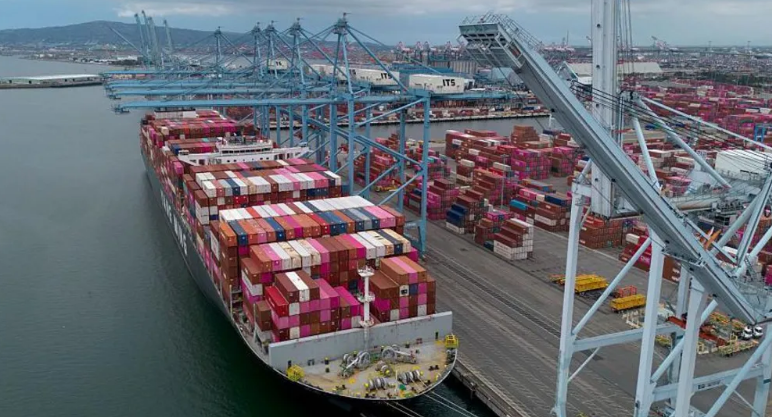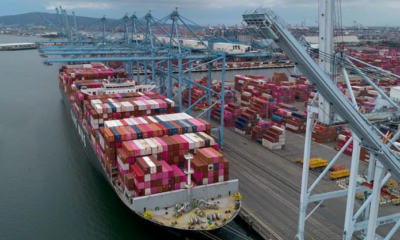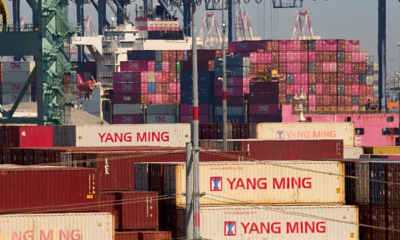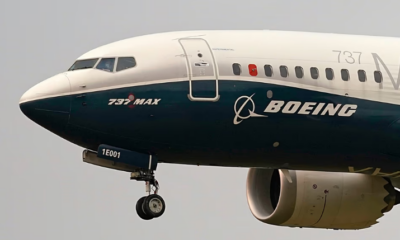Business
Bank of England Holds Interest Rates Amid Economic Uncertainty
The Bank of England (BoE) has decided to keep its main interest rate steady at 4.5% as policymakers navigate rising economic uncertainty, including potential tariff threats from the United States. The decision, which was widely anticipated, follows a similar move by the US Federal Reserve, which also held rates unchanged this week.
The nine-member Monetary Policy Committee (MPC) voted overwhelmingly in favor of maintaining the rate, with eight members supporting the decision and one advocating for a 0.25% cut. Since last August, the BoE has gradually reduced rates from a 16-year high of 5.25% after inflation retreated from over 10% to its current level of 3%.
Inflation Concerns Persist
Although inflation has eased significantly, it remains above the central bank’s 2% target and could rise further in the coming months. The impact of potential US tariffs under President Donald Trump’s policies has added to inflationary risks, with some economists predicting a spike to 4%.
“There’s a lot of economic uncertainty at the moment,” said Bank of England Governor Andrew Bailey. “We still think that interest rates are on a gradually declining path, but we’ve held them at 4.5% today.”
Bailey suggested that another rate cut could be on the horizon in May, contingent on economic developments. “We will be looking very closely at how the global and domestic economies are evolving. Our job is to ensure inflation stays low and stable,” he added.
Slow Economic Growth Raises Concerns
The British economy grew by just 0.1% in the fourth quarter of 2024, a disappointing outcome for the newly elected Labour government, which has prioritized economic expansion. The UK’s economic performance has struggled since the 2008-2009 financial crisis, consistently falling below its long-term growth trend.
Labour Chancellor Rachel Reeves has faced criticism for her economic policies, including tax increases on businesses. Some analysts argue that her cautious approach and rhetoric have dampened business confidence.
Market analysts expect the BoE to continue with gradual rate cuts throughout the year. Pantheon Macroeconomics predicts quarter-point cuts in May and November but acknowledges the risk of inflation pressures delaying further easing. “Persistent domestic inflation pressures could lead to the MPC holding rates for the rest of the year after a May cut,” the firm stated.
Market Reactions and Future Risks
Despite the BoE’s decision, the British pound strengthened, reaching a two-week high against the euro. FX analyst Kyle Chapman from Ballinger Group noted that traders had adjusted their expectations for future rate cuts. “There are no surprises here—every central bank is emphasizing uncertainty, which means there’s little reason to expect policymakers to deviate from their current approach,” he said.
Looking ahead, economists warn of potential headwinds for the UK economy, including tax hikes, geopolitical instability, and the impact of European military spending. “There is a long list of potential shocks coming the UK’s way,” Chapman cautioned.
As the BoE assesses economic conditions in the coming months, its decisions will be closely watched for signs of further policy adjustments to balance inflation control and economic growth.
Business
IMF Warns of Trade Tensions and AI Market Risks as Global Growth Remains Resilient

The International Monetary Fund (IMF) has highlighted trade tensions and a potential slowdown in the artificial intelligence (AI) sector as major risks to the global economy, even as it described growth prospects for 2026 as “resilient.”
In its latest World Economic Outlook, the IMF projected global growth at 3.3% this year, up from its previous forecast of 3.1%, before easing slightly to 3.2% in 2027. IMF chief economist Pierre Olivier Gourinchas said the world economy has been “shaking off the trade disruptions of 2025” and emerging stronger than expected, despite recent threats from US President Donald Trump to impose tariffs on eight European countries opposed to his Greenland proposal.
While AI-driven investment has supported growth, the IMF warned that overly optimistic expectations could trigger a market correction, with even a mild downturn affecting household wealth and corporate investment. “It doesn’t take as much of a market reaction to have an impact on people’s wealth relative to their income, so they start cutting consumption and businesses change their investment plans,” Gourinchas said.
Trade tensions remain another concern. The IMF cautioned that political or geopolitical conflicts could disrupt supply chains, commodity prices, and financial markets, weighing on global activity.
The report also stressed the importance of central bank independence for macroeconomic stability and long-term growth. Maintaining legal and operational independence allows central banks to anchor inflation expectations and avoid fiscal pressures. Gourinchas noted that pressures on central banks, particularly in countries with high borrowing needs, can lead to higher inflation and borrowing costs over time.
The IMF’s forecast for the United Kingdom showed slightly stronger growth than previously expected. The UK economy grew by 1.4% in 2025, up from a prior estimate of 1.3%, and is expected to expand 1.3% this year, making it the third-fastest growing G7 economy after the US and Canada. Growth is projected to rise to 1.5% in 2027. Chancellor Rachel Reeves described the figures as evidence that the UK is “on course to be the fastest growing European G7 economy this year and next,” while shadow chancellor Sir Mel Stride dismissed the increase as modest.
Inflation is expected to ease globally, falling from 4.1% in 2025 to 3.8% in 2026 and 3.4% in 2027. In the UK, inflation is projected to return to the 2% target by the end of the year as a weakening labour market keeps wage growth subdued.
Gourinchas said challenges to central bank independence, such as political pressure to keep interest rates low, have emerged in several countries. He warned that undermining central banks tends to produce inflation and higher borrowing costs, calling it “self-defeating.”
The IMF report comes amid heightened scrutiny of global central banks, including the US Federal Reserve, following recent legal investigations and political disputes, underscoring the fund’s emphasis on safeguarding institutional independence as a cornerstone of economic stability.
Business
China Reports 5% Economic Growth Amid Record Trade Surplus and Domestic Challenges

China said its economy grew by 5% in 2025, meeting the government’s official target despite a slowdown to 4.5% in the final quarter of the year, driven in part by a record trade surplus.
The world’s second-largest economy faced a year of weak domestic spending, a prolonged property market downturn, and ongoing uncertainty from US tariff policies. Analysts describe the figures as reflecting a “two-speed economy,” with manufacturing and exports supporting growth while consumer spending remains cautious and the housing sector continues to weigh on overall activity.
Some economists question the official numbers. Zichun Huang, a China economist at Capital Economics, said the figures “overstate the pace of economic expansion” by at least 1.5 percentage points, citing weak investment and subdued household consumption.
Data released on Monday also highlighted China’s deepening demographic challenges. The number of births fell to 7.9 million in 2025, the lowest since records began in 1949. The country’s population declined for the fourth consecutive year, dropping 3.4 million to 1.4 billion. Experts warn that falling birth rates could reduce demand for housing and consumer goods, adding pressure to an already struggling property market.
The property sector remains a key concern. House prices continued to fall in December, dropping 2.7% year-on-year, marking the sharpest decline in five months. Property investment fell 17.2% for the year. The prolonged slump affects construction activity, household wealth, and local government finances, leaving millions of homeowners with unfinished or devalued properties.
Retail sales rose only 0.9% in December, the slowest pace in three years, while factory output increased 5.2%, slightly up from November’s 4.8%. Analysts say export growth and manufacturing output are currently propping up the economy, while domestic consumption remains weak.
China recorded a record trade surplus of $1.19 trillion in 2025, driven by strong exports outside the United States. Alicia Garcia-Herrero, chief economist for Asia Pacific at Natixis, warned that “China is effectively pushing growth through exports at a loss,” a strategy that may not be sustainable as it can undermine profits and long-term expansion.
Speaking on Monday, Kang Yi, head of China’s National Bureau of Statistics, acknowledged the economy “faces problems and challenges, including strong supply and weak demand,” but said China can “maintain stable, sound growth momentum this year.”
Analysts say China faces a delicate balancing act. Policymakers aim to support growth through targeted stimulus and boost consumer confidence while avoiding excessive debt and reducing reliance on exports amid ongoing global trade tensions, including uncertainty over US tariff policies.
While China officially met its growth target, the underlying economic picture suggests caution. Weak domestic demand, a fragile property market, and demographic shifts indicate that sustaining long-term growth will require careful management of both fiscal and monetary policy.
Business
Stablecoins Hit Record Transaction Volumes as Governments and Firms Embrace Digital Payments

Stablecoins recorded a historic year in 2025, as both governments and private companies encouraged their adoption across financial systems worldwide. Total transaction volumes surged 72 percent over the year, reaching $33 trillion (€28 trillion), according to Artemis Analytics.
Unlike traditional cryptocurrencies, stablecoins are designed to maintain a stable value by pegging themselves to real-world assets, most commonly the US dollar. They are fully backed by reserves such as treasury bills or cash, allowing holders to redeem them on a 1:1 basis. More than 90 percent of stablecoins in circulation are dollar-pegged, with Tether’s USDT holding a market cap of $186 billion (€160 billion) and Circle’s USDC at $75 billion (€65 billion). In 2025, Circle processed $18.3 trillion (€15.7 trillion) in transactions, while USDT handled $13.3 trillion (€11.4 trillion).
A report by venture capital firm a16z highlighted that stablecoins facilitated at least $9 trillion (€7.7 trillion) in “real” user payments last year, an 87 percent increase from 2024. Analysts noted that this volume is more than five times that of PayPal and over half of Visa’s annual transaction throughput.
Central banks have also taken notice of the growing adoption of digital currencies. In addition to private stablecoins, several governments are developing central bank digital currencies (CBDCs). China’s digital yuan has been in pilot phases since 2019, while the European Central Bank is preparing to issue a digital euro, targeting 2029 for the first launch. McKinsey data shows that cash still accounts for 46 percent of global payments, but non-digital transactions are declining, particularly in developed countries with strong digital infrastructure.
The United States has taken a different approach. In January 2025, President Donald Trump signed an executive order blocking any government action to issue CBDCs, clearing the way for private stablecoins to dominate. Trump later approved the GENIUS Act, which established a comprehensive regulatory framework requiring stablecoin issuers to maintain full 1:1 reserve backing with liquid assets. The framework aims to ensure stability and encourage confidence in the use of digital dollars.
In Europe, stablecoin adoption continues under the EU’s Markets in Crypto-Assets (MiCA) regulation. By July 2026, firms must secure a Crypto-Asset Service Provider (CASP) licence to operate legally. Payments company Ingenico recently partnered with WalletConnect to allow merchants to accept stablecoins, including USDC and EURC, using existing terminals. WalletConnect’s CEO, Jess Houlgrave, said that while MiCA is not perfect, “some regulatory clarity is better than none,” and called for uniform enforcement to prevent regulatory shopping.
Crossmint, a stablecoin infrastructure provider, also secured a MiCA licence in Spain this week. General counsel Miguel Zapatero noted that obtaining the licence is costly but increases credibility, with other regulators often fast-tracking approvals for licensed firms.
As private stablecoins gain traction and CBDCs slowly roll out, 2025 marked a turning point in the integration of digital currencies into mainstream financial systems, showing strong institutional and corporate adoption while highlighting the global push for regulatory clarity.
-

 Entertainment1 year ago
Entertainment1 year agoMeta Acquires Tilda Swinton VR Doc ‘Impulse: Playing With Reality’
-

 Business2 years ago
Business2 years agoSaudi Arabia’s Model for Sustainable Aviation Practices
-

 Business2 years ago
Business2 years agoRecent Developments in Small Business Taxes
-

 Home Improvement1 year ago
Home Improvement1 year agoEffective Drain Cleaning: A Key to a Healthy Plumbing System
-

 Politics2 years ago
Politics2 years agoWho was Ebrahim Raisi and his status in Iranian Politics?
-

 Business2 years ago
Business2 years agoCarrectly: Revolutionizing Car Care in Chicago
-

 Sports1 year ago
Sports1 year agoKeely Hodgkinson Wins Britain’s First Athletics Gold at Paris Olympics in 800m
-

 Business2 years ago
Business2 years agoSaudi Arabia: Foreign Direct Investment Rises by 5.6% in Q1




























